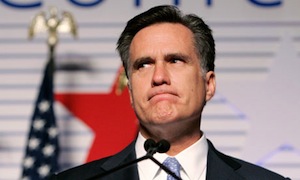While MSNBC and Fox News bicker over how many of Mitt Romney’s tax returns have been released, there is a giant gaping void where they could be talking about substance. To remind those talking heads and their producers trying their best to imitate ESPN, the US is at war, and at least one of the two candidates refuses to clearly articulate a policy on Afghanistan.
Josh Rogin, of Foreign Policy’s The Cable, “asked several senior senators from both parties whether they supported Romney’s plan for Afghanistan. None was able to articulate exactly what that policy is or what the U.S. force in Afghanistan might look like if Romney is elected.”
 To be fair, Romney has pointed to two superficial things he would do differently than Obama on Afghanistan. First, he would obey the military commanders. In order to make that sound less fascistic, Romney’s website says he would “never make national-security decisions based upon electoral politics.” This has to be a joke. Romney’s current opaqueness on Afghanistan is itself “based on electoral politics,” just like everything else Romney has ever done.
To be fair, Romney has pointed to two superficial things he would do differently than Obama on Afghanistan. First, he would obey the military commanders. In order to make that sound less fascistic, Romney’s website says he would “never make national-security decisions based upon electoral politics.” This has to be a joke. Romney’s current opaqueness on Afghanistan is itself “based on electoral politics,” just like everything else Romney has ever done.
The second difference Romney points to is that he would not have publicly announced the 2014 withdrawal date, although he “supports” it “as a realistic timetable.” So he would have the same policy as Obama, he just wouldn’t tell the American people.
Thanks to Rogin, we can see senior senators squirm trying to play it off like they know what Romney’s policy on Afghanistan is, whether they can discern any difference with Obama’s policy.
“What is it?” said Sen. Lindsey Graham (R-SC), a Romney supporter and senior member of the Armed Services Committee. “I think [Romney’s policy is] ‘listen to the commanders’ and if it’s that, that’s OK with me.”
…Senate Minority Whip Jon Kyl (R-AZ) said he wasn’t sure exactly what Romney’s Afghanistan policy entailed and didn’t want to get into it.
“You would have to tell me what exactly you mean by ‘his policy.’ That’s a long discussion that I don’t want to get into,” Kyl told The Cable.
…Senate Armed Services Committee Chairman Carl Levin (D-MI) told The Cable that the issue is just one more example of the Romney campaign avoiding tackling tough issues.
“I sure don’t know what [Romney’s Afghanistan policy] is,” Levin said. “From what I’ve read, I can’t fathom his position on Afghanistan any more than I can fathom his position on a whole bunch of other things.”
“I don’t know that he’s flip-flopped on Afghanistan. I don’t know that he’s ever taken a clear position. It’s not like some of the other positions he’s so consistently flip-flopped on,” Levin said. “Here, I don’t know what the flip is or the flop.”
Romney’s evasion is a result of two things. First, 60 percent of Americans want to bring the troops home quickly and the entire political establishment, including about 50 NATO countries, agree with the current “withdrawal” plan. Clearly, Romney’s not going to get more hawkish on Afghanistan, because its not politically palatable. Everyone agrees the war is a lost quagmire. As Dexter Filkins wrote recently in the New Yorker, reiterating the establishment view: “After eleven years, nearly two thousand Americans killed, sixteen thousand Americans wounded, nearly four hundred billion dollars spent, and more than twelve thousand Afghan civilians dead since 2007, the war in Afghanistan has come to this: the United States is leaving, mission not accomplished.”
The second reason Romney is intentionally evading is because he is about as unprincipled as he was portrayed in the primary campaign. Romney’s convictions depend on their current political advantage. If having a conviction is unlikely to yield political benefits, Romney becomes indistinct, noncommittal. He seems to be rendering a crude imitation of exactly the sort of “empty suit” Obama was accused of being in 2008.
[For a similar look at Romney’s foreign policy vis-a-vis the 2012 campaign, see Romney & Obama Agree on Iran: Keep Up Aggression, Impede Peace]


